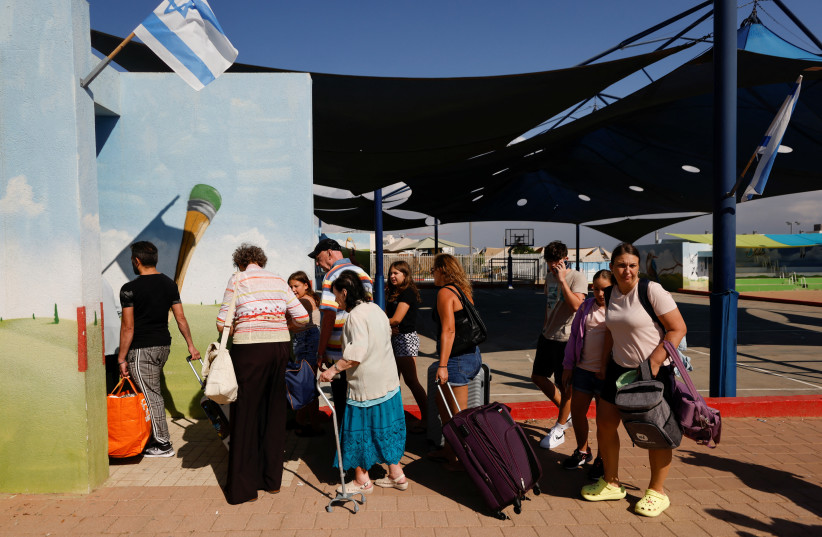Miki Gavrielov put it most succinctly before his slot in the otherwise jazz-based fundraiser for the First Line Med organization, at the Tassa bar and music venue in Tel Aviv on Sunday evening. “They say that, when the cannons are roaring, the muses fall silent,” he noted, citing an old Soviet concept which, in turn, feeds off an observation by first-century BCE Roman statesman and philosopher Cicero who posited that laws are suspended during wartime.
First Line Med provides medical support – physical and emotional – to victims of war here, and is currently working round the clock to help those who are experiencing the trauma of the current horrific local events.
In case anyone thought there is nothing happening on the live music scene at the moment, veteran singer-songwriter Gavrielov disabused us of that notion by adding: “The music goes on,” before launching into “Annee Ve’atta” (You and I), an emotive anthemic song he scored for late preeminent pop singer Arik Einstein over 50 years ago, which talks of a better future for us all. He was supported on the bandstand by his heavily pregnant vocalist daughter Shira, and an instrumental quartet including flutist, and artistic director for the evening, Mattan Klein.
>>> Click to support First Line Med
It was a moving and strangely incongruous intimate event attended by around 25 people, family and friends of the performing artists, and others connected to the local jazz scene. Meanwhile, as the show progressed, with the music interspersed by videoed messages from people whose loved ones are being held hostage in Gaza, and medical professionals, a tense silence hung over Tel Aviv where rocket warning sirens have become a daily occurrence over the past couple of weeks.
Thankfully, as the event was live streamed around the globe via Israeli embassies around the world, courtesy of the Cultural Diplomacy Division of the Foreign Ministry, while the muses may not have been silent inside Tassa, the urban evening air was relatively becalmed.

But, as one of the organizers of the fundraiser, jazz journalist Yotam Ziv, said in his opening address: “When the words are lost the music appears.” That it did, as the likes of Klein, seasoned pianist Yoav Polachek, fellow keyboardists Roy Mor and Uriel Herman et al, played a broadly sweeping repertoire of self-penned works and intriguing arrangements of time-honored numbers such as “Hayoo Leilot” (There Were Nights) which found its way into the Israeli national musical pantheon, and was most memorably performed by, divas Shoshana Damari and Esther Ofarim.
The music and messages included some highly pertinent words from Martin Hummel, founder of British-based record label Ubuntu Music, whose recording stable includes the majority of Sunday evening’s artist roster.
The guest of honor
There was also a bona fide VIP in the lineup, in the form of acoustic bass player Jean-Luc Bodson, who earns a crust as the Belgian Ambassador to Israel. Bodson has a good grasp of local and regional matters, having already chalked up three-and-a-half years of sterling diplomatic service here, and with a three-plus decade bio that includes postings to Colombia and Morocco.
Before he picked up his instrument and joined Polachek, Klein, and the rest of the band in a stirring rendition of hit pop ballad “Fragile,” by Sting, he talked about a visit he paid to Kibbutz Kfar Aza a couple of days after the war began, and the spine chilling stories he heard about the atrocities committed there.
That placed the musical offerings, and the work of First Line Med, in sharp focus as civilian efforts to support the survivors and those close to the Israeli hostages in Gaza continue. He said he had listened to accounts from kibbutzniks whose children were taken captive by Hamas terrorists. “I’m a father,” Bodson poignantly pointed out. “I hope we will be able to bring all the hostages home.”
Hopefully, that will happen sooner rather than later, and the families of the hostages who are going through a living hell can again hug their children, parents, grandparents, and siblings and get back to a more normal way of life. With First Line Med’s help, all concerned will, hopefully over time, begin to work through the emotional wounds left by the unimaginably traumatic events.
For his part, Bodson feels music and, specifically, jazz, can help to offset anxiety, and promote more healthy channels of dialogue. “One of the things that jazz has taught me is to listen,” he observes, adding he felt honored to be invited to play with “excellent Israeli jazz musicians.” He made those remarks at a recent date at his official residence, marking the centenary of legendary Belgian jazz harmonica player Toots Thielemans, who died in 2016 at the age of 94.
The bass-playing ambassador was delighted to get another chance to mix it with some of our top artists at Tassa and, particularly, to help raise precious resources to support First Line Med’s invaluable work. “If you don’t listen, jazz doesn’t mean anything. You can’t just read your music sheet. You have to listen to what the others are doing. That is a lesson in life. We live in a world in which people have lost the ability to listen.”
The audience at Tassa was certainly listening on Sunday evening, and via digital platforms around the world. That, one hopes, will support First Line Med’s efforts to address the emotional fallout of the terrorist attack and the ongoing war. “Playing with these musicians is, first of all, a message of empathy. If you don’t show empathy no one will listen to you. You should listen to the suffering of others without immediately offering advice. First there is the message of empathy and then, of course, peace.”
Empathy is certainly a sentiment embraced by First Line Med. The other objective will, presumably, take a little longer to achieve.
>>> Click to support First Line Med
